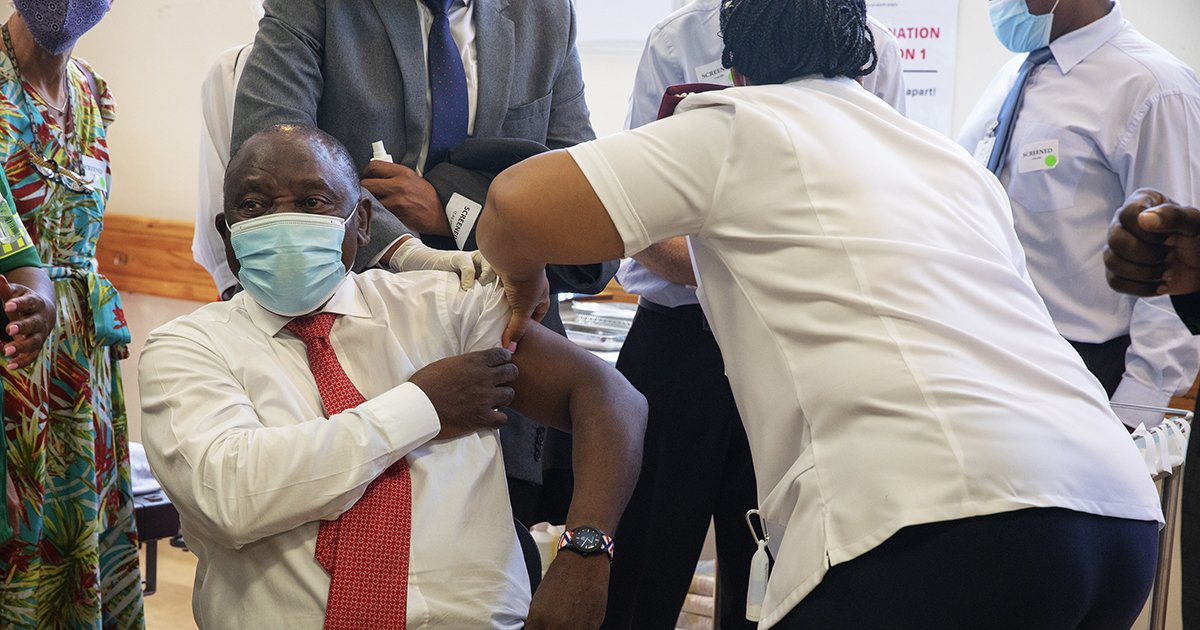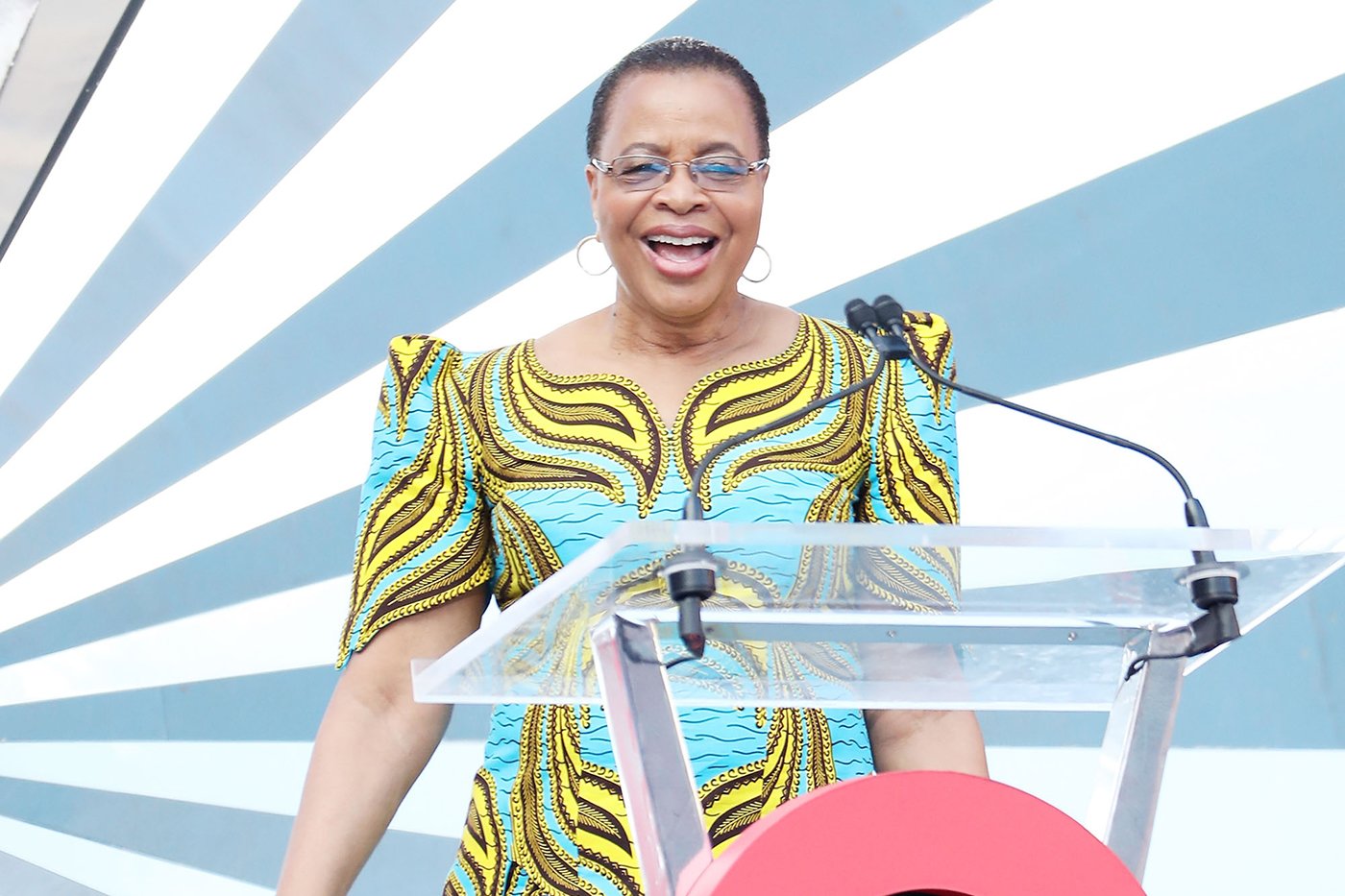Africa is lagging far behind in its vaccine rollout plan, having inoculated just 1% of the entire continent’s population as of April 2021—and its main problem is access to the all-important vaccine market.
While rich countries like the United States and the United Kingdom — both of which have purchased more than enough vaccines for their populations — celebrate fully vaccinating more than 30% and 20% of their populations respectively, leaders across Africa are standing up to ensure the continent gets its fair share.
This “vaccine nationalism,” or vaccine hoarding, where higher-income countries have purchased more than enough vaccines than needed and are leaving poorer countries to scramble for their share, has set the continent (and the world) back in defeating the COVID-19 pandemic.
It has also set Africa’s development back by up to five years, according to executive secretary of the United Nations Economic Commission for Africa, Vera Songwe. Vaccine inequity will slow Africa’s growth by creating a barrier between those looking to travel and do business with the continent. It will prevent the creation of millions of jobs and continue to cost thousands of lives.
We look at the seven African leaders who have used their voices and platforms to call on the rest of the world to promote vaccine equity and ensure global solidarity. These are some of the leaders from the continent who have pushed for access to vaccines for everyone, everywhere.
Dr. Tedros Adhanom Ghebreyesus
Director-General of the World Health Organization
 Dr. Tedros Adhanom Ghebreyesus, Director-General, World Health Organization (WHO) speaks at a press conference.
Dr. Tedros Adhanom Ghebreyesus, Director-General, World Health Organization (WHO) speaks at a press conference.
Ethiopian biologist and Director-General of the World Health Organization (WHO), Dr. Tedros Adhanom Ghebreyesus, has highlighted many times the negative impact that vaccine nationalism could have on vulnerable nations, and the world overall.
At the WHO’s annual executive board meeting in January 2021, he emphasized that vaccine nationalism could prolong the pandemic and put the world on the brink of “catastrophic moral failure.”
He added: “Even as they speak the language of equitable access, some countries and companies continue to prioritize bilateral deals…driving up prices and attempting to jump to the front of the queue. This is wrong.”
In an article published in Foreign Policy Magazine, Dr. Tedros also wrote: "Allowing the majority of the world's population to go unvaccinated will not only perpetuate needless illness and deaths and the pain of ongoing lockdowns, but also spawn new virus mutations as COVID-19 continues to spread among unprotected populations."
Dr. John Nkengasong
Director of Africa CDC

Director of the Africa Centres for Disease Control and Prevention (Africa CDC) Dr. John Nkengasong has publicly slammed the unfair distribution of vaccines. He has also pointed out that Africa will struggle to reach its vaccine target of immunizing 30% of its people this year, having administered so far just 2% of the global supply of vaccines.
“It would be extremely terrible if the world watches Africa not receiving vaccines and sees the global North getting the vaccines,” Nkengasong said at a press conference in 2020. “That would really create a moral issue. We’ve all talked about the need to exercise global solidarity. The time to translate those powerful words into action is now.”
“Many Western countries have got vaccines in excess of their needs,” he added. “We find ourselves at a pivotal moment in the history of our continent. Without access to these vaccines in a timely and equitable manner, our whole development will be challenged.”
Nkengasong has also pledged his support for Global Citizen’s VAX LIVE campaign, calling for accessible vaccines for all.
President Cyril Ramaphosa
President of South Africa
 South African President Cyril Ramaphosa receives a Johnson and Johnson COVID-19 vaccine in Khayelitsha, Cape Town, South Africa, Feb. 17, 2021. Ramaphosa was among the first in his country to receive the vaccination to launch the inoculation drive.
South African President Cyril Ramaphosa receives a Johnson and Johnson COVID-19 vaccine in Khayelitsha, Cape Town, South Africa, Feb. 17, 2021. Ramaphosa was among the first in his country to receive the vaccination to launch the inoculation drive.
South African President Cyril Ramaphosa receives a Johnson and Johnson COVID-19 vaccine in Khayelitsha, Cape Town, South Africa, Feb. 17, 2021. Ramaphosa was among the first in his country to receive the vaccination to launch the inoculation drive.
South Africa’s president has been consistently vocal about vaccine inequity, as well as calling for manufacturing facilities so Africa can make its own vaccines. At the start of 2021, before any vaccines had touched-down on South African soil, Ramaphosa used his platform to criticize richer nations for hoarding vaccines.
“We are concerned about vaccine nationalism,” Ramaphosa said at the World Economic Forum’s Davos Agenda in January. “The rich countries of the world went out and acquired large doses of vaccines from the developers and manufacturers of these vaccines. Some countries went beyond and acquired four times what their population needs, and that was aimed at hoarding these vaccines.”
He also went on to explain that the hoarding of vaccines was being done to exclude countries that need them most.
Ramaphosa is also among international leaders who have joined Global Citizen in calling for every person everywhere to have access to a COVID-19 vaccine through the VAX LIVE campaign.
President Paul Kagame
President of Rwanda
 Rwanda's President Paul Kagame at a virtual meeting with the Africa Union's special envoys, 2020.
Rwanda's President Paul Kagame at a virtual meeting with the Africa Union's special envoys, 2020.
Rwanda's President Paul Kagame at a virtual meeting with the Africa Union's special envoys, 2020.
Alongside President Ramaphosa, Rwanda’s President Paul Kagame has been one of Africa’s most persistent heads of state when it comes to speaking out against vaccine hoarding. In an article published in the Guardian, Kagame slammed vaccine nationalism and briefly gave an outline of how it actually costs a lot more to hoard than it does to share vaccines with those in need.
Kagame wrote: “There are worrying signs of vaccine nationalism in Europe and North America. The pressures on political leaders to vaccinate all their citizens before sharing supplies with others is understandable. But forcing smaller or poorer countries to wait until everyone in the north has been catered for is shortsighted.”
“We’re not asking for charity, but fairness — instead of the hoarding and protectionism currently in play,” he added.
Ngozi Okonjo-Iweala
Director-General of the World Trade Organization

Both the first woman and the first African to lead the organization, Director-General of the World Trade Organization (WTO) Ngozi Okonjo-Iweala immediately addressed vaccine inequity on her first day on the job in March 2021.
She roughly laid out a proposal for how the WTO could handle the pandemic and its impacts on the developing world in her first speech as director-general.
“I propose that we ‘walk and chew gum’ by also focusing on the immediate needs of dozens of poor countries that have yet to vaccinate a single person. People are dying in poor countries,” she said.
Speaking to Reuters a month earlier, Okonjo-Iweala highlighted that vaccine nationalism would hurt all countries, not just those that are vulnerable.
“No one is safe until everyone is safe. Vaccine nationalism at this time just will not pay, because the variants are coming. If other countries are not immunised, it will just be a blowback,” the Nigerian economist said. “It’s unconscionable that people will be dying elsewhere, waiting in a queue, when we have the technology.”
Phumzile Mlambo-Ngcuka
Executive Director of UN Women
 Phumzile Mlambo-Ngcuka says balanced cabinets made better decisions not just for women, but for broader society and economies, and provided role models for the next generation of both girls and boys.
Phumzile Mlambo-Ngcuka says balanced cabinets made better decisions not just for women, but for broader society and economies, and provided role models for the next generation of both girls and boys.
In early April 2021, Phumzile Mlambo-Ngcuka spoke to Global Citizen about the impact that COVID-19 has had on women and girls. The executive director of UN Women has been vocal about vaccine equity not only among vulnerable countries and communities that need them most, but among marginalized communities that are too often left behind in cases of global urgency.
We asked what message she has for world leaders on vaccine equity, to which she replied: “I would in particular, say something to the countries that are hoarding vaccines, alert them about the importance of global solidarity, and the fact that a virus anywhere is a virus everywhere.”
“As long as we are not all safe, no one is safe,” she added. “It is in their best interest to facilitate doses that must go to Africa and other under-served parts of the world, because their safety is superficial if the rest of the world is not safe.”
Graça Machel
Former First Lady of South Africa
 Graca Machel speaks on stage during the Global Citizen Festival: Mandela 100 at FNB Stadium on Dec. 2, 2018 in Johannesburg, South Africa.
Graca Machel speaks on stage during the Global Citizen Festival: Mandela 100 at FNB Stadium on Dec. 2, 2018 in Johannesburg, South Africa.
Graca Machel speaks on stage during the Global Citizen Festival: Mandela 100 at FNB Stadium on Dec. 2, 2018 in Johannesburg, South Africa.
South Africa’s former first lady has also pledged her support for Global Citizen's VAX LIVE campaign.
In a campaign statement released internationally that included contributions from other world leaders such as Dr. Nkengasong and President Ramaphosa, Graça Machel also added her voice to the call for vaccines for all.
“Vaccine equity is not just a public health concern,” she said. “It is an issue of social justice and a matter of our collective survival. Nobody will be protected against COVID-19 until everybody is. There will be no socio-economic recovery for anyone, in any country, unless we prioritize an equal global public health response.”
This article was written in partnership with the Bill and Melinda Gates Foundation, a funding partner of Global Citizen.
As part of Global Citizen’s Recovery Plan for the World campaign, VAX LIVE: The Concert to Reunite the World will bring together artists, entertainers, world leaders, and more to ensure equitable vaccine distribution around the world, tackle COVID-19 vaccine hesitancy, and celebrate a hopeful future.
Find out how to tune in here, and join us in taking action to end the pandemic and ensure that everyone, everywhere has access to COVID-19 vaccines. Then, head to our multimedia hub VAX BECAUSE to join candid conversations about the pandemic and find answers to your biggest questions about the vaccines.
Want to take home part of the show? Check out our VAX LIVE merch at the Global Citizen official store.
